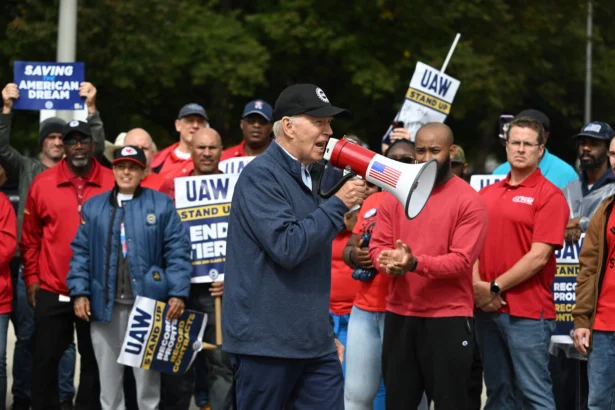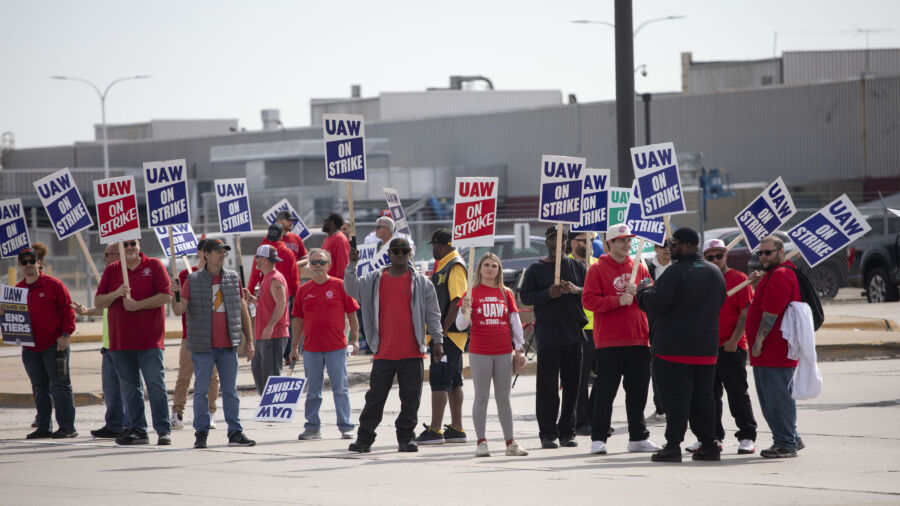Autoworkers at the first Ford factory to go on strike in decades have voted overwhelmingly to ratify a tentative contract agreement reached with the vehicle maker late last month.
The United Auto Workers (UAW) union announced members of UAW Local 900 at Ford’s Michigan Assembly Plant in Wayne voted 82 percent in favor of ratifying the new four-year, eight-month deal in a Nov. 2 statement.
A total of 3,087 workers at the plant, which makes the Ford Bronco midsize SUV and Ranger midsize pickup, voted in favor and 683 were against the contract, the union said.
“Local 900 helped launch the Stand Up Strike on Sept. 15, and was the first Ford local to strike in decades,” the UAW said. “Local 900 members walked the picket line for 41 days before reaching a tentative agreement with Ford, the first of the Big Three automakers to reach a deal with the UAW. The union has suspended the Stand Up Strike while the ratification process goes forward.”
UAW members began striking against Ford, General Motors, and Stellantis in September after failing to reach a deal on a new labor contract by the 11:59 p.m. Sept. 14 deadline.
The strikes followed weeks of failed negotiations over increased wages, enhanced benefits, pensions, and working conditions, as requested by the roughly 146,000 union members at all three of the Detroit auto companies.
However, in the weeks since the strike began, automakers have more than doubled their initial wage hike offers, agreed to raise wages along with inflation, and improved pay for temporary workers.
Strike Hits Auto Industry Earnings
The strike against the three automakers–known as the Big Three—has so far resulted in more than an estimated $9 billion in economic losses for the automobile industry, according to estimates from the Anderson Economic Group (AEG).
It has also cost workers $488 million in lost wages and resulted in dealers and customers collectively losing $1.86 billion, while suppliers have taken a $2.78 billion hit, according to AEG.
Union leaders announced it had reached a tentative deal with Ford on Oct. 25.
The deal includes a 25 percent pay rise with an immediate 11 percent wage hike upon ratification, and cost-of-living raises that will put the pay increase over 30 percent by the time the contracts end on April 30, 2028, to more than $40 per hour for top-scale assembly plant workers.
In addition, the union secured a 150 percent raise for current Ford temps through the 2023 agreement, a 33 percent top wage increase through 2023, and a historic three-year wage progression.
Workers hired after 2009 without defined benefit pensions will also receive 10 percent annual company contributions to 401(k) plans, along with $5,000 ratification bonuses.
The tentative deal requires ratification by a majority of Ford’s 57,000 union-represented employees.
“The gains in the deal at Ford are valued at more than four times the gains from the union’s 2019 contract,” the UAW said. “The new agreement provides more in base wage increases than Ford workers have received in the past 22 years.”

Biden Welcomes ‘Historic’ Agreements
According to the union, the lowest-paid workers at Ford will see a raise of more than 150 percent over the life of the agreement, with some workers receiving an immediate 85 percent increase upon ratification.
“The agreement reinstates major benefits lost during the Great Recession, including cost-of-living allowances [sic] and a three-year wage progression, as well as killing divisive wage tiers in the union. It improves retirement for current retirees, those workers with pensions, and those who have 401(k) plans. It also includes a historic right to strike over plant closures, a first for the union,” the UAW said.
Soon after the deal with Ford was announced, the union also reached similar tentative agreements with Stellantis and General Motors.
While the UAW has welcomed the deals, some experts have warned the new pay hikes could result in the three automakers having to raise prices higher at a time when costs have already soared and competition is high, particularly amid a push to transition to electric vehicles.
“The three tentative agreements show the UAW’s power and the car companies’ weakness,” said Erik Gordon, a business and law professor at the University of Michigan. “The companies are trying to figure out how to transition to EVs [electric vehicles] without losing too many billions of dollars, and now face a huge bump in labor costs for the products that will finance the EV transition.”
Still, President Joe Biden on Monday welcomed the last of the “historic agreements” with the Big Three American automakers, calling the deals “a testament to the power of unions and collective bargaining to build strong middle-class jobs while helping our most iconic American companies thrive.”
“This historic tentative agreement rewards the autoworkers who have sacrificed so much with the record raises, more paid leave, greater retirement security, and more rights and respect at work,” President Biden said.
The president noted UAW members will continue to vote on the tentative deals in the coming weeks but will return to work in the meantime.
The Associated Press contributed to this report.
From The Epoch Times


